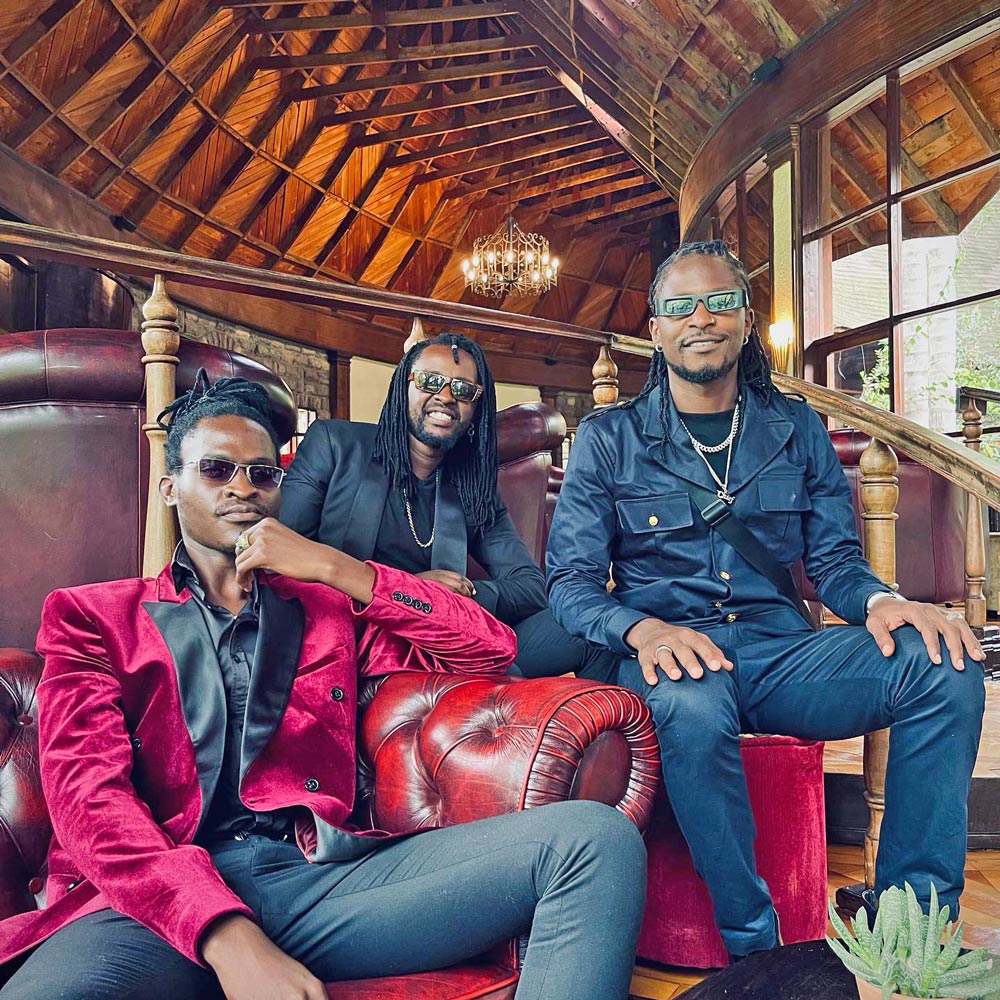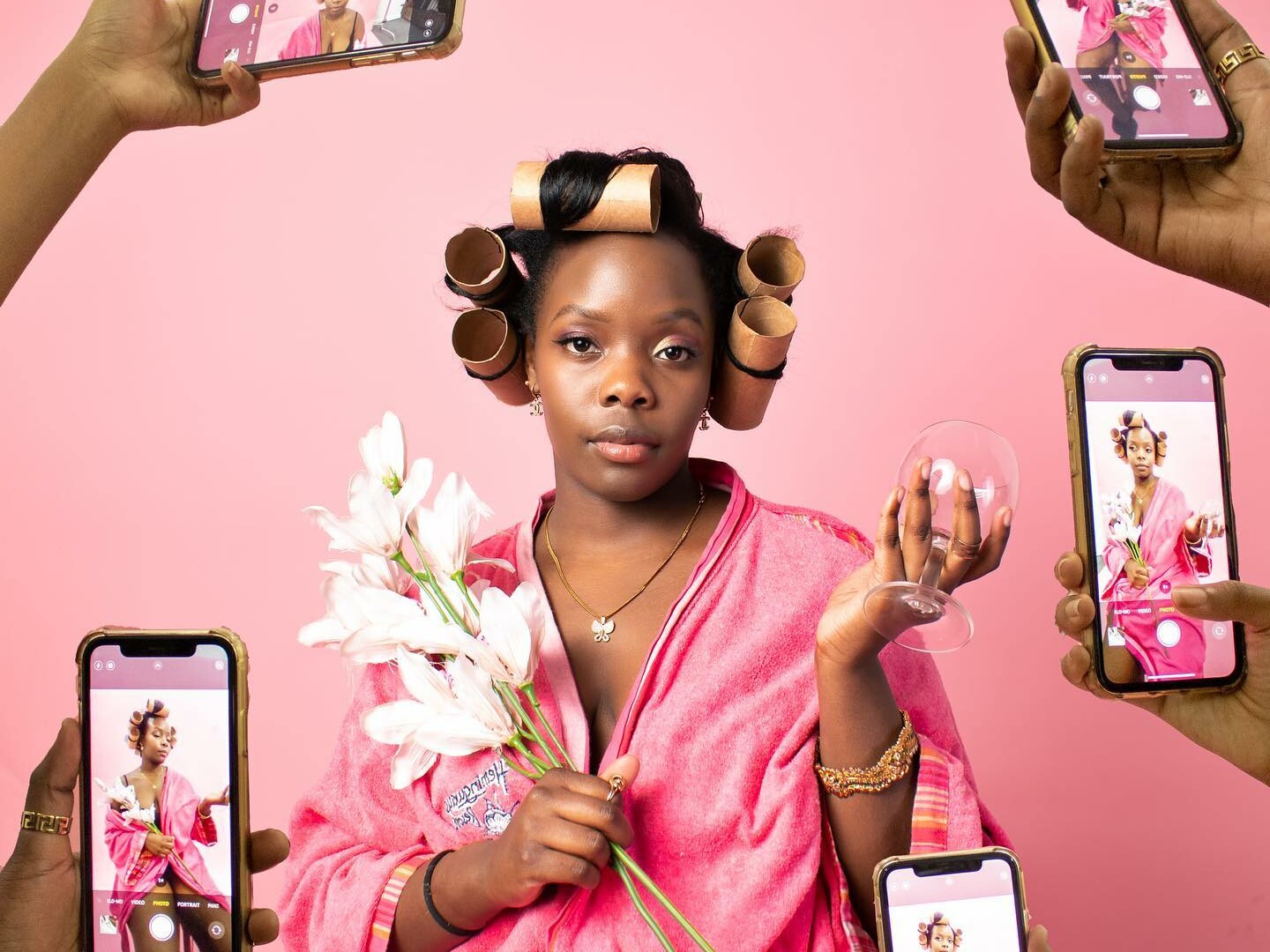Deeply entrenched in Kenyan musical history is the fact that music bands, or music groups and collectives, go on to attain more success than lone acts. From the past days of groups such as Orchestra Super Mazembe and Ukoo Flani, to the likes of Camp Mulla, P-Unit, and Sauti Sol, artists belonging to a group seem to have more staying power than their lone-ranging counterparts.
Among the Kenyan music groups that have risen to mainstream fame in recent years is H_art The Band. Known for their unique style dubbed Afro-Poetry which combines their smooth African-inspired harmonies with a touch of spoken word poetry, the group, which comprises of Mordecai Mwini Kimeu, Wachira Gatama and Kenneth Muya Mukhwana (Kenchez), have for the better part of the last decade become one of the most beloved groups in Kenya and East Africa. Their albums Made in the Streets, Simple Man, and Party Time, released in 2019, 2021 and 2022 respectively, all products of the sublime vocals of Mordecai, the smooth acoustic accompaniments of self-taught guitarist Kenchez, and the spoken word poetry of Wachira, gave us songs that speak to Kenyans from all walks of life.

Time
The group’s 4th album ‘Time’ finds the trio in their unique element to offer a compilation of 11 tender tracks. Released in October 2023, Time comprises 11 songs that lean towards softness more than bravado; tenderness over friction. As the first track starts, an invitation is made, an invitation into a musical world that demands the listener let go of anything that may hinder their appreciation of this offering.
When the titular track, Time, starts, it feels as if you are meeting old friends after a long time, friends who have been away on a long journey and have come back with wisdom to share. “There’s time for everything under the sun…” Mordecai starts. His voice is soft over the guitar and percussions guiding the melody, and then a pause. The harmonies carry the message of the song home and all you want to do is sit and listen, and maybe try to sing along. The sound is familiar, everything works to set the stage for what is to come. When we get to the bridge, and the background vocals come in, our feet are firmly in their world. And then Wachira’s voice, familiar and fitting. His verse, delivered in his method spoken word approach, complements the song fittingly, echoing what Mordecai has been singing, “Kuna time ya kila kitu, na hii ndio time.”
With the second track Habibty, there is something to be said about intertextuality, or at least how artists rub off of each other. It’s hard to say which artist the song reminds you of because it is clear H_art the Band are a product of many interactions and experiences, but you can hear hints of Kidum, Eric Wainaina, Manasseh Shalom and when Phyl The Kagongo comes in with his verse in Luhya, it is hard not to hear echoes of Sauti Sol. Habibty’s production is familiar, like Deja Vu, but for music, while still sounding new and exciting. Habibty is proof that if there is anything we have in abundance as Kenyans, it’s the linguistic variety to express exactly what we are feeling.
The transition from Habibty to Mada Dada is almost seamless, the earnestness in the declaration of love carried over and juxtaposed with Wachira’s playfulness in his verse. Whether it is Mordecai, free of pretence, declaring: “Ni wewe nimekuwa nikingoja dada / Oh baby there’s not other…” to Wachira’s lighthearted “Ukichora ah ah, unanipea mimi mahanjam sijiwezi dada / na please uniamini dada sitachukua bila kupewa Idi Amin Dada…” one thing is clear: H_art the Band know how to express their feelings about love.
Complications of Love
With an understanding that it would be disingenuous to speak of love without speaking of suffering, In W.Y.L.M, the album’s 5th track, the band push their exploration of love to rockier terrain by asking the timeless existential question: Would you love me? The complicated reasons behind romance are also explored in Umenikosea and Kipenda Roho. In the three tracks, Mordecai, the main vocalist, dexterously employs his incandescent voice and his ability to talk about romance in a way that is anything but cliché.
W.Y.L.M‘s beat has the same inviting melody as the one in Waenda, with the guitar in both songs sounding like something you would hear in American Grunge music maybe without the roughness. You could say both songs contain the best verses by Wachira when compared to the other songs in the album. Waenda talks about the frustrations that come with heartbreak; the pain that comes with lost love. Barua is similar in its expression of love, a narrative describing an unsuccessful declaration of love.
In the groovy, but introspective 9th track Karma, the band comes to the same conclusion the wise men came to all those many years ago; Better to have loved and lost than never to have loved at all. I mean, does it feel horrible to fall out of love with someone you’ve grown together with? Indeed. Should you regret loving? No you shouldn’t. People should live their lives authentically, embracing love in its various expressions, and allowing others the same freedom. “I hope you find what you are looking for / pearls and diamonds and so much more / everything you been looking for”.
Other Themes
Love is not the only theme explored in this project. In the penultimate track, Mbio, featuring Eric Wainaina, the group dives into the unknowable nature of the future, interrogating the struggle for survival through time, from the present into the “unknown” future. The last song, Never Seen, is a Gospel track recorded in a similar choir-backed style as their popular song EL Shadai. In Never Seen the trio expresses gratitude to God for his perpetual grace and love. The song employs a Benga beat, whose instrumentation caps off the album with verve.
Time is an avid display of sonic cohesion that reveals the dexterity of three very talented Kenyan artists. Having once said, “In hope, dreams are dreamt and the dreamers go out there to chase that dream till it’s in their reach,” the dream they were talking about seems to have come true.
Frank Njugi
Frank Njugi is a Kenyan Writer, Page Poet, Culture Journalist and Critic. He has written for platforms such as Debunk Media, The Standard Kenya Newspaper, Sinema Focus, Afrocritik, The Cauldron,The Moveee, Africa in Dialogue, Brittle Paper, Salamander Ink Magazine and others. He tweets as @franknjugi




